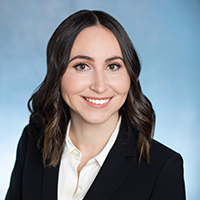
Tips from the Bench: Judge Tamila Ipema

Miller, Monson, Peshel, Polacek & Hoshaw
Judge Tamila Ebrahimi Ipema is the first Iranian-American Judge appointed to the bench of the California Superior Court in San Diego. She was born and raised in Tehran, Iran. Her father, a human rights activist and lawyer, instilled the importance of education in his children, including Judge Ipema. Her parents gave her the choice of marrying young, as her mother and grandmother had done before her, or pursuing an education. Judge Ipema chose the latter and obtained her bachelor’s degree from Damavand College in Tehran, Iran, by the age of 20.
In 1978, when a political revolution in Iran seemed imminent, Judge Ipema immigrated to the United States with her mother and younger siblings. While working on her master’s degree and working several part-time jobs to support her family, she spent hours at the university law library studying U.S. immigration laws and international refugee laws to help the rest of her family escape Iran’s new regime. Through her efforts, she succeeded in obtaining refugee status for her eldest brother and his family in Canada through the United Nations High Commission for Refugees, and asylum for the rest of her family.
After successfully preparing and filing petitions on behalf of her family members, she discovered her calling to become an attorney. She obtained her J.D. from the Brandeis School of Law in Louisville, Kentucky, and later obtained an LL.M. in International and Comparative Law at Georgetown University School of Law.

Path to the Bench
After being admitted to the California Bar, Judge Ipema fought for the rights of refugees and asylum seekers as an immigration defense attorney and Assistant District Counsel for the U.S. Department of Justice. In 2000, she began her path to the bench when she worked as a research attorney and a supervising research attorney at Los Angeles Superior Court. In 2005, she was selected as a Commissioner at the Los Angeles Superior Court. Then, in 2008, she was selected as a Commissioner at the San Diego Superior Court. According to San Diego Superior Court’s website, “A commissioner is an attorney selected by the judges of the court and given powers to hear and make decisions concerning certain legal matters, including family and juvenile court cases, as well as criminal, traffic, small claims and unlawful detainer cases.”
Judge Ipema did not initially aspire to become a judge because she did not believe it was possible for someone with no political ties to the United States whose third language was English to become a judge. However, Judge William MacLaughlin, her presiding judge, encouraged her to apply for a judgeship. When she told him it was not possible for her to be a judge, Judge MacLaughlin replied that she would never know unless she tried.
In 2009, Governor Arnold Schwarzenegger appointed Judge Ipema as the first Iranian-American judge to the bench of the California Superior Court in San Diego.
Transition to the Bench
Judge Ipema’s transition to the bench was smooth in terms of making case decisions. She reflects that she had already worn a “neutral” hat as a research attorney and Commissioner at the Los Angeles Superior Court. The most difficult adjustment for her as a new judge was learning how to navigate a courtroom with more than 200 disgruntled people waiting for their day in court. She learned that presiding over a courtroom is a balance between conducting hearings efficiently and giving everyone their day in court by providing equal access to justice for all.
Judge Ipema has been a judge for 17 years and has tried her hand in almost all areas of the law. She is currently assigned to the criminal division. She notes that although her family law assignment was the most difficult, it was the most rewarding, as she was able to help parents come together and focus on what really mattered — the best interest of their children.
Throughout her judgeship, Judge Ipema has dedicated herself to fostering fairness and diversity in the legal community. She chaired the National Association of Woman Judges’ (NAWJ) Color of Justice and MentorJet programs for ten years to create diversity pipelines to the bench. The NAWJ is an association of female judges who are dedicated to preserving judicial independence for women, minorities and other historically disfavored groups while increasing the number and advancement of female judges and providing cutting-edge judicial education. For three years, Judge Ipema chaired NAWJ’s Success Inside and Out program at the Las Colinas Detention Facility for women. Success Inside and Out is a re-entry program aimed at closing the revolving doors to jail by providing women, who are within six months from being released, the resources they need to obtain education, employment, shelter, reconnect with family, and recover from substance abuse.
Tips for New Lawyers
Judge Ipema cautions new lawyers to know the rules of ethics and professional responsibility and to never jeopardize their reputation to win a case. Once you make an ethical violation before a court, you will never be able to recover your credibility.
She also remarked that some lawyers tend to only focus on excelling at work and forget to become active in their community. She encourages lawyers to join their local bar organization and mentor children and students. Judge Ipema explained lawyers are role models and can help make a difference in their communities.
The Future of the Court
Judge Ipema notes the COVID-19 pandemic has forced courts to change the way they do business for the better. There is now a greater ease of appearing in court with the option to appear virtually. Appearing virtually creates greater access to justice for poor litigants who might not have the $25 to pay for parking downtown at the courthouse and for the elderly who are disabled with mobility issues. Due to the option to appear virtually, Judge Ipema has seen an increase in the number of people who are able to attend their hearings.
The courts are currently holding jury trials albeit in a more limited capacity to make courtrooms safer for everyone. The pandemic has created a backlog in the courts especially with jury trials. Judge Ipema reflects that although there is a shortage of court employees, the staff and judges of San Diego County Superior Court are working harder than ever with an unending dedication to make our justice system the best in California.